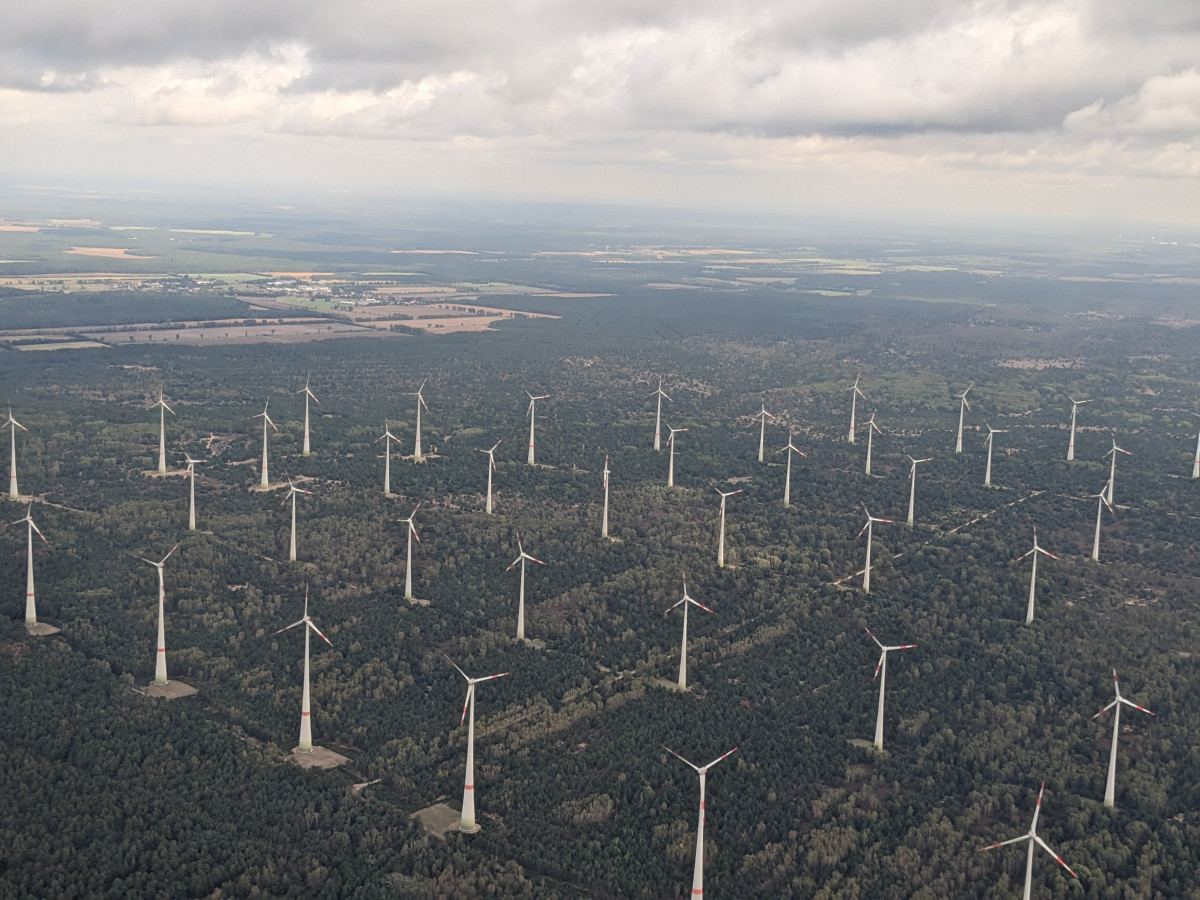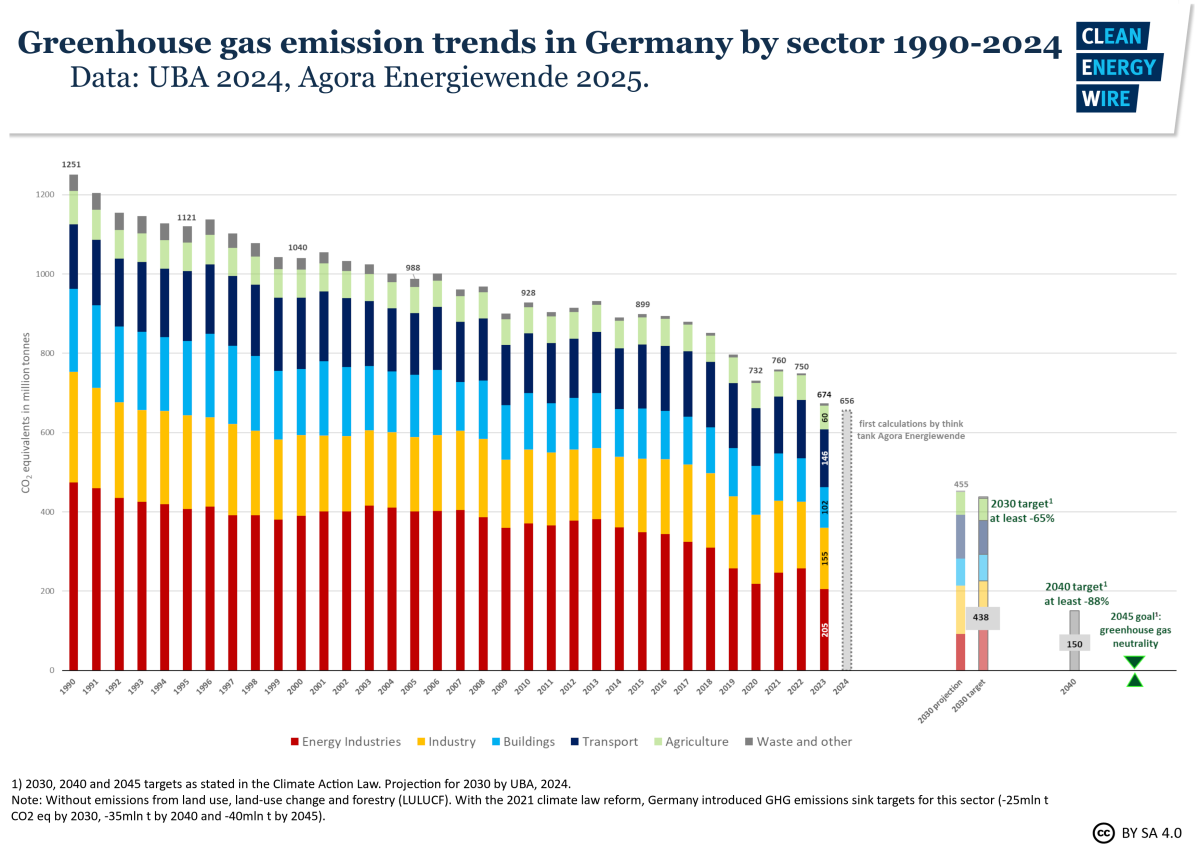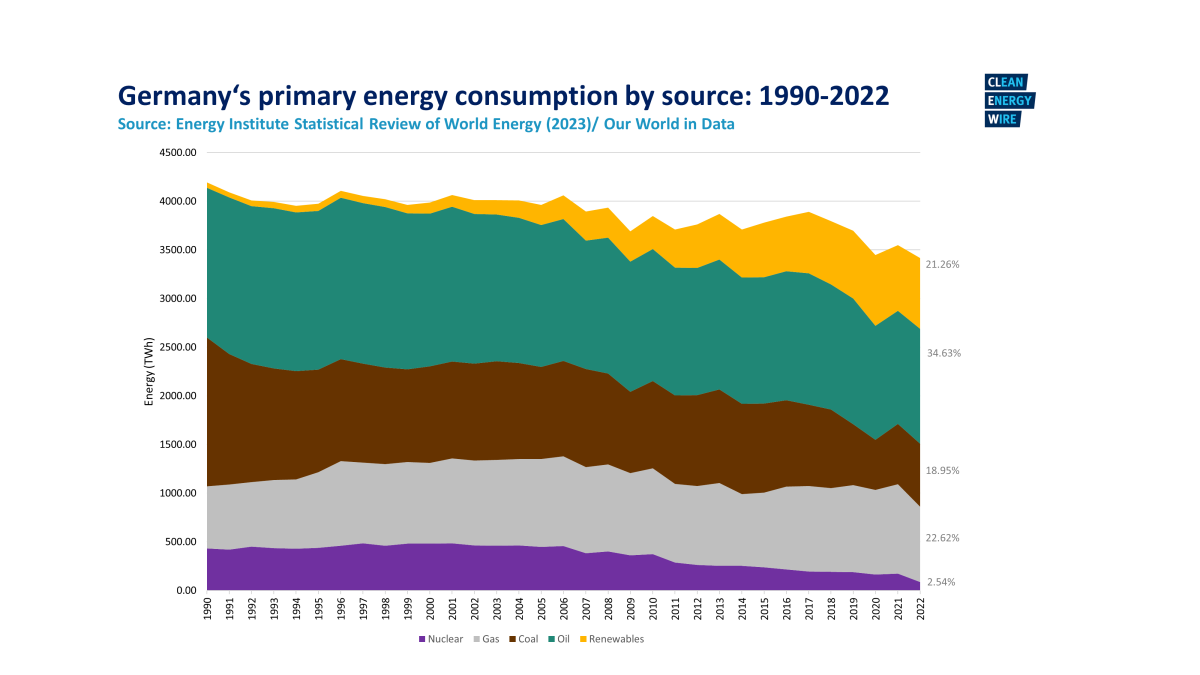CLEW Guide – Germany nears 2030 climate target thanks to renewables expansion, must act on heating and transport
With its “CLEW Guide” series, the Clean Energy Wire newsroom and contributors from across Europe are providing journalists with a bird's-eye view of the climate-friendly transition from key countries and the bloc as a whole. You can also sign up to the weekly newsletter here to receive our "Dispatch from..." – weekly updates from Germany, France, Italy, Croatia, Poland and the EU on the need-to-know about the continent’s move to climate neutrality.
Content:
Key background
- As Europe’s largest economy, Germany is a key energy hub in the heart of the continent.
- Germany has enforced a legally binding target to reach climate neutrality by 2045. It aims to achieve this by phasing out fossil fuels, expanding renewable energy sources, improving energy efficiency, and storing remaining emissions underground. The transformation affects every part of the economy: from electricity generation, to industry, transport, and heating.
- By the end of 2024, total greenhouse gas emissions had fallen by 48 percent compared to 1990 levels. Germany is seen as a global case study on how to decarbonise an advanced industrial nation. Germany’s energy transition (Energiewende) – the transition to a climate-neutral and nuclear-free energy system – has had broad public backing.
- Wind and solar power are set to become the backbone of the electricity system. Together with other renewables, they already provide more than half of Germany’s electricity, and their rollout has meant that Germany is broadly on track to reach its 2030 goal of cutting emissions by 65 percent compared to 1990 levels.
- Germany completed its nuclear phase-out in early 2023 – ending a decades-long process – and aims to phase out coal-fired power generation by 2038 at the latest. There are no phase-out targets for oil and gas.
- Renewable energy covered 20 percent of Germany’s primary energy consumption in 2024. Oil and gas – used mostly in transport, heating, and industry – continued to dominate the total energy mix.
- The current coalition government, in power since May 2025, agreed to stick to Germany’s climate targets but signalled it would not be more ambitious. It is headed by chancellor Friedrich Merz of the conservative CDU/CSU alliance, which partnered with the Social Democrats (SPD). In their coalition agreement, the parties spelled out policy plans for the next four years, which include a reduction in electricity prices, industry support and infrastructure modernisation.
- Germany’s greenhouse gas reduction efforts are interlinked with the climate policy architecture of the European Union, with the EU Emissions Trading System (ETS) being a key tool.
Major transition stories
- German industry is at the heart of the economy and it must find a way to make production processes climate-friendly. An ongoing drop in manufacturing activity, an ageing labour market, and international competition all add to the challenge. Industry leaders support the transition to climate neutrality but insist on substantial financial and regulatory support.
- Hydrogen – especially green hydrogen made with renewable energy – is set to play a key role in the move to a climate-friendly economy, but significant hurdles, like high costs, remain before widespread adoption. Merz’s government plans to scale back some plans intended to make Germany a leader in hydrogen technologies.
- Carbon capture and storage or use (CCS, CCU) is another climate solution for heavy industry. The government is paving the way for these technologies, but many applications remain controversial because of high costs, the technology still being in its nascent stages and the risk of diverting attention from immediate emission cuts.
- Frontier Technologies – In the increasingly urgent fight against climate change, countless new technologies are being touted as future solutions, from novel carbon dioxide removal methods to nuclear fusion. Germany wants to be a global frontrunner in many of these technologies, trying to catch up on CCS, and with plans to build the world’s first nuclear fusion reactor.
- With a climate adaptation strategy that includes measurable targets, Germany is stepping up its efforts to be climate resilient. The country’s municipalities are required to draw up risk assessments and implement measures to better deal with increasing periods of heavy rain, high heat, and more frequent flooding.
- Battery storage capacity has grown rapidly, and there is a large appetite for bringing more projects to life. Batteries are a key technology in a renewable energy system, providing flexibility, grid stability, and the ability to bridge periods of low power generation – but grid operators say their expansion needs better coordination.
- Germany needs to provide adequate backup capacity for the growing share of intermittent renewable power to ensure it can deliver enough electricity at all times. Merz’s government proposed auctions for 20 gigawatts (GW) of new gas power plant capacity, but it may need to scale back those plans. Germany’s electricity supply remains secure in the mid-term, but a delay in making electricity consumption more flexible increases the need for new generation capacity that does not depend on the weather.
- For many years, electricity grid expansion lagged behind in Germany, especially concerning big transmission lines between the country’s windy north and its industrial base in the south. This has led to costly balancing measures, but construction is progressing. Germany boasts a very reliable electricity grid. As the country phases out fossil gas to reach climate targets, it will at the same time have to come up with a plan on how to decommission or repurpose its gas grid– until now a key source of revenue for hundreds of local utilities and mainly used in the heating and industry sectors.
- With the Nord Stream pipelines, Germany had relied on cheap Russian gas for industrial processes and heating buildings. The energy crisis, Russia’s invasion of Ukraine and the resulting halt in direct gas deliveries massively increased gas prices and laid bare the risk of dependence on one main supplier. While Germany still heavily relies on imported fossil fuels and raw materials, it has since diversified its suppliers and built alternative import capacities. Norway and the US now supply the largest shares of fossil gas to Germany.
- Energy prices and a just transition – Electricity and gas prices remain comparatively high in Germany after the 2022 energy crisis. Industry groups have urged the government to reduce prices in the long term. While many energy-intensive companies are exempt from power taxes and levies, the electricity prices paid by industry are one of the most contentious aspects of Germany's energy transition, particularly in terms of economic impacts. Germany’s household electricity prices are also among the highest in the world. Rising carbon prices, both in the EU Emissions Trading System (EU ETS) and Germany’s national CO2 price for transport and heating fuels, add to the issue. The government plans to implement support measures and policies, particularly to ease the burden on low-income households and enable them to take an active part in the transition.
- A rise in support for right-wing populist parties might get in the way of pursuing more ambitious climate action in Germany and Europe. Researchers say that the rightward shift highlights the importance of ensuring climate policies are socially just and that everyone can take part in the transition to cleaner mobility and heating. Meanwhile, the accompanying anti-immigration sentiment does little to alleviate Germany’s looming skilled labour shortage. The far-right and populist AfD is currently tied with the conservative CDU/CSU alliance in national polls.
Sector overview
Energy
- The energy sector is responsible for roughly 30 percent of total GHG emissions in Germany. CO2 emissions from the energy sector had fallen by 61 percent in 2024 compared to 1990 levels.
- The expansion of renewable energy sources has meant that Germany’s electricity mix is the “cleanest ever” and has significantly driven greenhouse gas emissions down.
- Germany has auctioned feed-in support payments to drive the expansion of renewable power since the 1990s, guaranteeing projects set remuneration for every kilowatt-hour they produce. Early on, citizen wind and solar projects helped ignite a shift to renewables that raised the share in the power mix of wind turbines, solar panels and other renewable technologies from 4 percent in 1990 to 55 percent in 2024 (2030 target: 80 percent).
- Germany is planning to massively expand renewables over the coming decade. By mid-2025, the country had installed 100 GW of solar power (target: 215 GW by 2030), 66 GW of onshore wind power (target: 115 GW by 2030), and 9 GW of offshore wind power (target: 30 GW by 2030).
- The final German nuclear power plants were shut down in April 2023, completing a decades-long phase-out process. The legal phase-out date for coal is 2038, and there are no phase out targets for oil and gas.
- Oil, gas and coal are still the dominant energy sources in, for example, transport and heating. As sectors are electrified, total energy use will decline because much less is wasted as heat and processes become more efficient. Fossil fuels do not need to be replaced with the same amount of renewable energy.
- Germany aims to introduce a capacity market by 2028 to help finance flexible power capacity like new gas-fired power plants (which would later have to undergo costly retrofits to run on hydrogen or be fitted with equally costly carbon capture technology).
- Renewable curtailments and costly redispatch measures have resulted in a constant debate to split Germany’s single power price zone, which Germany has refused.
- Germany made a splash in 2024 for its rapid uptake of so-called balcony power plants.
Industry
- Industry is responsible for 24 percent of total GHG emissions in Germany, with most emissions covered under the EU ETS. Industrial emissions had fallen by 45 percent in 2024 compared to 1990 levels.
- Germany is set on making its world-renowned industry (e.g. steel, chemicals, cement) climate-neutral and to become a world leader in the industrial production of the future. Both Germany and the EU have introduced measures set to boost international competitiveness. Companies now see business opportunities in the global race to net-zero industrial processes.
- A pioneering “climate contract” support scheme for decarbonisation in industry, worth billions of euros, compensates projects for the extra costs of slashing emissions.
- Germany is paving the way for carbon capture and storage (CCS) or use (CCU). Chancellor Merz’s government considers technologies to capture, transport and permanently store carbon dioxide deep underground as “indispensable” in reaching Germany’s 2045 target of climate neutrality – and net-negative emissions after 2050.
- Germany unveiled a “High-Tech Agenda” which sets ambitious targets for technologies it considers key for the energy transition, such as batteries, synthetic fuels, and industrial carbon capture. Merz’s government will also increase support for nuclear fusion research, with the goal of building “the world’s first fusion reactor”.
- Researchers have said it is unrealistic for Germany to carry out all energy-intensive production steps for green raw materials in the future, mainly because renewable electricity generation will be much cheaper elsewhere. The country should focus not on the initial energy-intensive processes, but the subsequent processing in the steel and chemical industries and in the downstream sectors of the economy, they argued.
Buildings
- One of Germany’s biggest hurdles in becoming climate neutral is the building sector, as emissions from heating have not yet dropped sufficiently. Buildings are responsible for 16 percent of total GHG emissions in Germany (only direct emissions; the given percentage excludes emissions from electricity use, district heating, industrial buildings).
- Heat pumps are the go-to heating source for new buildings, yet existing buildings are still largely heated with fossil fuels. In 2024, 56 percent of German homes were heated with gas, 17 percent with oil, 16 percent with district heating, and 4 percent with heat pumps or geothermal energy.
- A controversial debate around a law to gradually phase-out fossil fuel heating led to a sharp drop in heat pump sales in 2024. Homeowners can get up to 70 percent of the cost of installing a climate-friendly heating system reimbursed through state support. The future of the law hangs in the balance as chancellor Merz’s coalition have pledged to abolish parts of it. However, the government would then have to present alternative measures to reduce emissions in the sector.
- Large towns have until mid-2026 to present so-called “heating plans” detailing how their heating requirements can be met in a climate-neutral way in the future, for example, through district heating networks. Small towns have until mid-2028 to present such plans.
- Germany has a tiered system to share carbon costs between landlords and tenants. People renting poorly insulated homes can pass on up to 95 percent of the national price on carbon from heating emissions to their landlord, which is supposed to incentivise the latter to make energy-saving investments.
- Energy-efficient home renovations have picked up slightly in recent years, but the renovation rate remains too low to meet emission reduction targets in the sector.
- The use of air conditioning is on the rise in Germany as summers become hotter. Production of AC units has also risen sharply in the past five years.
Mobility
- Germany’s transport sector is lagging behind when it comes to emission reductions, as it has repeatedly failed to meet reduction targets. The sector is responsible for 22 percent of the country’s total GHG emissions.
- Car-loving Germany has many policies that support the use of passenger cars, including no general motorway speed limit, and still often tries to accommodate the needs of the country's carmakers, which have invested in expensive, high-end combustion engine models like ever bigger SUVs.
- Tarnished by the Dieselgate scandal, Germany’s iconic carmakers VW, BMW and Daimler struggle in the global transition to electric vehicles. Low demand, international competition and tariffs all add to the industry’s woes. The number of EVs registered in the country stood at 1.65 million in January 2025 – in a fleet of more than 49 million passenger cars. About 44 million of these are still fuelled by diesel or petrol.
- Infrastructure investments are the focus of Germany's historic 500 billion euros spending package, with a substantial share earmarked for road and rail modernisation work. Rail operator Deutsche Bahn has become the target of strong criticism as heavily delayed investments in infrastructure have caused severe disruptions to long-distance travel.
- The flat-rate ticket for regional and local travel (Deutschlandticket), introduced in 2023, has been credited with increasing mobility rates and reducing transport emissions.
- People in German cities are completing more journeys by bicycle or foot, while the dominance of cars is decreasing, according to the latest 'Mobility in Germany' report. Mobility experts say there are too few attractive public transport services in rural areas for a serious shift away from cars.
- Freight transport produces one third of transport emissions in the trade hub in Europe’s heart. Volumes are growing, but greening the sector isn’t a top priority.
- Low water levels in the Rhine river — Germany’s most important shipping route for raw materials — as a result of climate change threaten to severely disrupt supply chains reliant on water transport.
Agriculture
- The sector is responsible for eight percent of total GHG emissions (mainly methane from livestock farming, nitrous oxide as result of nitrogen fertilisation; the given percentage excludes LULUCF).
- Emissions have fallen by a quarter in Germany since 1990, largely in the years following German reunification when livestock numbers were reduced.
- Like everywhere in the world, the reduction of emissions in farming also depends on shifts in food consumption, which leads to polarising debates on changes required to personal lifestyles and traditional eating habits.
- Annual meat consumption in Germany is in decline, and many people now consider the impact their dietary choices have on the environment.
- Policymakers are in close talks with farmers to balance their needs with the need to mitigate and adapt to the effects of climate change.
Land use, land-use change and forestry (LULUCF)
- Germany’s forests and moors have become net carbon emitters due to human activity, heatwaves, pest infestations, wildfires, and consecutive years of prolonged drought. Germany is set to miss its mid-term climate targets for forests, peatland and soils, but aims to turn these parts of the natural world into a net carbon sink again.
- Climate law target: -25 mln tonnes by 2030, -35 mln t by 2040, -40 mln t by 2045.
- The previous government under Olaf Scholz introduced measures for natural climate action and a moorland strategy.
Find an interviewee
Find an interviewee from Germany in the CLEW expert database. The list includes researchers, politicians, government agencies, NGOs and businesses with expertise in various areas of the transition to climate neutrality from across Europe.
Get in touch
As a Berlin-based energy and climate news service, we at CLEW have a ten-year track record of supporting high-quality journalism on Germany’s energy transition and Europe’s move to climate neutrality. For support on your next story, get in touch with our team of journalists.
Tips and tricks
- CLEW’s Easy Guide to Germany’s transition with background information and links to key energy and climate data.




